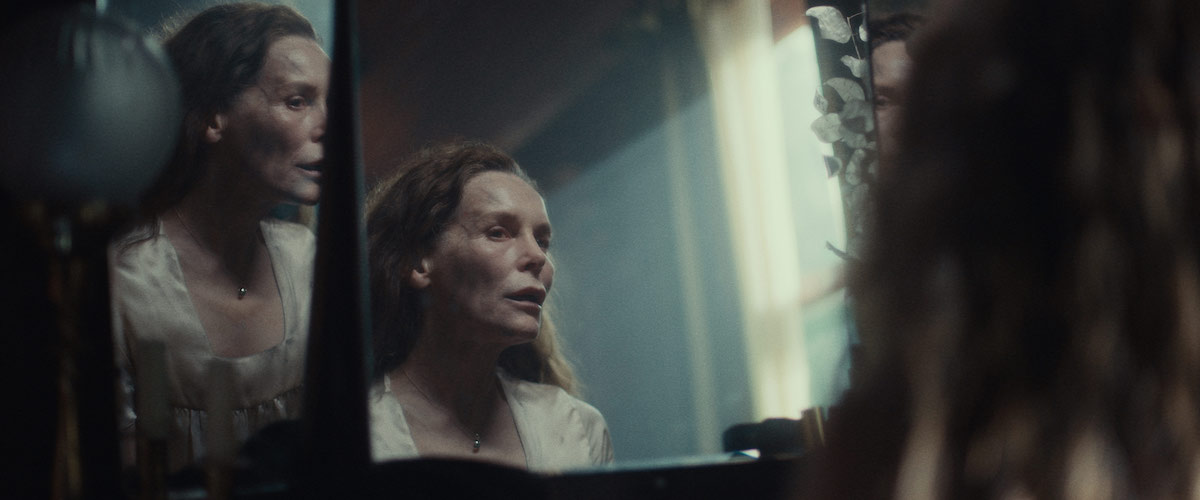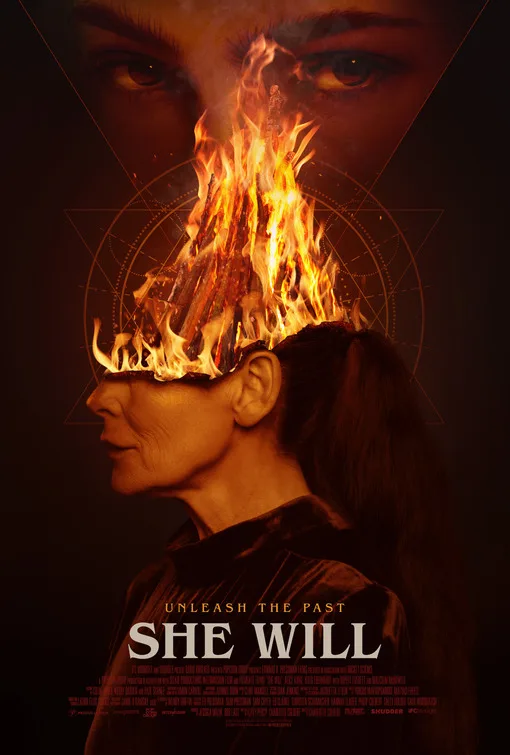"Their ash fills the earth." The earth in Charlotte Colbert's directorial debut "She Will" is filled with a lot of things: rotted fallen leaves, shards of charcoal and coal residue, and, as legend has it, the ashes of the witches burned there in 1722. It all mixes into an oozing primordial sludge with a mind of its own. The ground holds the memory of what happened upon it. "She Will" extends this idea to the human body, specifically women's bodies. Bodies remember what happened to them, even if the individual's consciousness refuses to allow that knowledge.
"She Will," produced by horror master Dario Argento, is a very striking film, and won the best First Feature award at the Locarno International Film Festival. "She Will" isn't exactly a horror movie. It has its creepy moments, particularly in the visual collages and Clint Mansell's unnerving score, but it's more thought-provoking than scary. It's not too difficult to believe that the past sins against women—i.e. witch burning—would make it to future generations as a distant echo, creating solidarity with those who came before.
Veronica Ghent (Alice Krige) is an aging movie star, traveling by train to a remote area in Scotland for what she believes will be a "solitary" retreat. She has just undergone a double mastectomy, and the tabloids are having a field day about what might have "gone wrong" with her undisclosed surgery. Still wrapped in bandages, Veronica has a nurse traveling with her, a young woman with bleached-white hair named Desi (Kota Eberhardt), who at first displays irritation at the imperious manner of her employer, but soon grows to appreciate and even share Veronica's physical and psychic pain. Upon arrival, Veronica is horrified to learn that it is not a solitary retreat at all. A bunch of people have gathered there, doing woo-woo group activities led by a pompous flamboyantly-dressed "artist" named Tirador (Rupert Everett), who declares himself a "feminist." (Look out.) Everyone recognizes Veronica. This is the worst possible place for her to recover.
She has no idea how bad it is going to get.
Veronica and Desi are given their own rustic cabin, surrounded by the ranks of tall trees. One morning, Desi wakes up to find that a muddy sludge has infiltrated the cabin, having slid down the slopes and through the walls. She cleans it up. That sludge keeps returning though, dominating Veronica's awful vivid dreams, where she wanders through the forest, witnessing the witch burnings and other atrocities, the mud curling around and grasping at her toes. Veronica, in short, begins to lose it, but what is actually happening, of course, is she is finding herself. She is finally feeling and accepting her own trauma, long buried behind the mask of her fame and beauty. "Every mask has a function," she informs Desi, as she smears on red lipstick.
At the age of 13, Veronica became a star in a movie directed by "auteur" Eric Hathbourne (Malcolm McDowell). A remake is now planned, also to be directed by Hathbourne, and his sudden emergence in the press again—their pictures paired together on tabloids after so many years—along with the mastectomy, has rattled some things loose from Veronica's past. In a talk show interview which Hathbourne assumes will be friendly, the host ambushes him with questions about his "inappropriate" relationship back in the day with the 13-year-old actress he discovered. Hathbourne is so flustered he vomits—on air—after sputtering some nonsense about how things were "different back then." They sure were.
Along with co-writer Kitty Percy, Colbert has crafted a rich tale centered on an intergenerational relationship between two women—Veronica and Desi—who slowly thaw to one another as Desi steps into her caretaking role, and Veronica steps into her own power. Desi realizes there is something not at all right about what is going on at this retreat, and wants to get her charge out of there as quickly as possible. The most interesting thing, though, is that Veronica—when faced with the horrors of the past (her own and womankind's, in general), she is strengthened, she is not at all afraid. Her reckoning with the past is long overdue.
There are a couple of missteps in "She Will," one being Desi's experience with a local guy, who seems like bad news from moment one. It's an attempt to loop Desi in to the "fate" of women, but it's unnecessary. The relationship between Veronica and Desi is paramount and the two actresses do a marvelous job creating that hesitant trajectory, from mistrust to trust.
Cinematographer Jamie Ramsay has a field day with the hallucinatory qualities inherent in reality: the trees like quiet sentinels, the thick mist obscuring mysterious fleeing figures, the stray thin light wavering through musty windows. Nothing is on the level; everything appears to whisper of something else. The whole world looks weird. Ramsay has a lot of fun with doubling. For example, a still lake reflects the surrounding landscape in such a dizzying way it is impossible to tell which is the reflection and which is the reality. The images are pieced together impressionistically, not literally, by editors Yorgos Mavropsaridis and Matyas Fekete, creating a post-traumatic sense of the haze of painful memories, collective and otherwise.
Some pasts are too painful to look at directly. Veronica finds within herself the strength to look, and in so doing provides a powerful example to the young Desi of transforming pain into something else. Fire doesn't just destroy. It purifies.
Now playing in select theaters and available on demand.




















